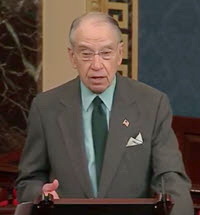
Roundtable-supported legislation that would accelerate depreciation for high performance upgrades in commercial and multifamily buildings – creating jobs and reducing the built environment’s carbon footprint – was reintroduced this week by House Ways and Means Committee members Brad Schneider (D-IL) and Tom Rice (R-SC).
The E-QUIP Approach
- The bipartisan Energy Efficient Qualified Improvement Property (E-QUIP) Act (H.R. 2346), originally introduced last December by Reps. Schneider and Rice, encourages energy efficiency building retrofits to replace aging and obsolete HVAC, lighting, windows, roofs, and windows with state-of-the-art systems.
- The Real Estate Roundtable has rallied a unique coalition of environmental, manufacturing, and business groups to support the bill. The coalition sent an April 1 letter to members of the House Ways and Means Committee, and the Energy and Commerce Committee, to enact the E-QUIP Act and include it in any infrastructure package.
- Roundtable President and CEO Jeffrey DeBoer stated, “The E-QUIP Act checks all of the boxes for smart energy, climate, and economic policy. Installation of high performance HVAC, lights, windows, and other building components will modernize aging buildings, save businesses billions of dollars on their energy bills, create tens of thousands of jobs, and avoid carbon emissions equal to taking 22 million cars off the road for a year.”
- DeBoer added, “The E-QUIP Act can also encourage state-of-the-art retrofits that enhance outdoor air ventilation rates — a key practice to improve a building’s health and indoor air quality, according to the best available science.”
Support for an Energy Efficient Economy

- The American Council for an Energy-Efficient Economy (ACEEE) has prepared a fact sheet and analysis that estimates the climate, energy, and jobs benefits of E-QUIP Act retrofit projects:
- 130,000 net additional job-years.
- $15 billion energy bill savings.
- 100 million tons of carbon dioxide emissions avoided – or the equivalent emissions from 560,000 rail cars full of coal or taking 22 million cars off the road for one year.
- Key elements of the E-QUIP Act are:
- Elective 10-year, straight-line cost recovery period for a new category of depreciable property that meets the E-QUIP Act’s high-performance standards.
- Available to replace or retrofit systems and components in buildings that are at least 10 years old.
- Certification requirement that E-QUIP is designed, installed, operated, and maintained by credentialed professionals.
- Five-year duration of incentive.
- A uniform 10-year depreciation period for components that meet E-QUIP standards would simplify the current cost recovery “patchwork” in the federal tax code for building investments.
The E-QUIP Act and advocacy efforts to include it as part of infrastructure legislation will be a focus of discussion during The Roundtable’s April 20 (Remote) Spring Meeting.
# # #


